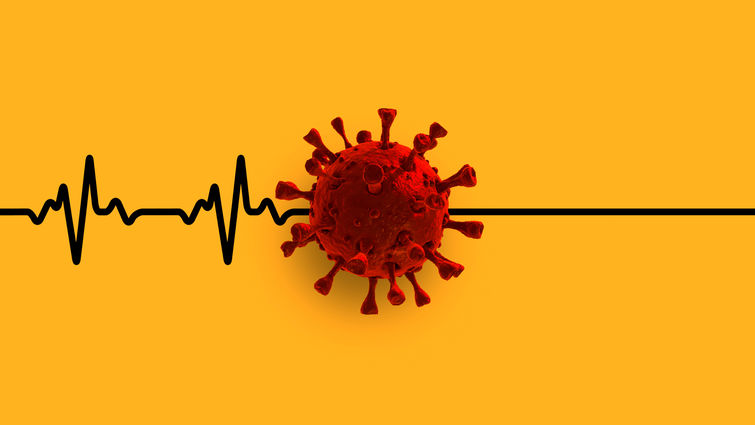
As the winter influenza (flu) season merges with the COVID-19 pandemic, people with cardiovascular disease (CVD) must remain vigilant to safeguard their health and recognize potential damages from either kind of infection.
Purvi Parwani, MD, a cardiologist at Loma Linda University International Heart Institute, discusses differences and correlations between flu and COVID-19 viruses, as well as how to avoid contracting the viruses.
Being especially vulnerable to respiratory infections, people with CVD are more likely to experience severe symptoms and complications when infected with a virus, including the contagious respiratory illnesses — flu and COVID-19 — caused by different viruses, Parwani says. She says distinguishing between the severity of the complications derived from COVID-19 infection versus flu infection is key in gaining an accurate understanding of each virus and the precautionary measures needed to avoid them.
Mortality rate is one of the most significant differences between COVID-19 and the flu, which is reportedly almost 15 times higher for COVID than the flu. The same study discloses that in anywhere from 15-70% of COVID-related deaths, people had underlying CVD. Parwani also says people with CVD who contracted COVID-19 require critical care far more frequently than cases of CVD patients contracting the flu.
Another notable difference between the viruses: COVID-19 leaves long-term impacts on the heart far more frequently than the flu. Parwani says she has not seen patients first-hand who report lingering symptoms of pain, shortness of breath, heart palpitations and dizziness after flu infection. This stands in stark contrast with her experiences treating patients at the COVID Heart Clinic, she says, where patients of all walks of life report serious post-COVID symptoms like arrhythmia or blood clots in the lungs and legs.
Though COVID-19 generally elicits more dangerous complications for cardiac patients than the flu, influeza infection also carries a set of real risks — especially during its prime time spanning from October to May. According to the CDC, heart disease has been one of the most frequent underlying chronic conditions in adults hospitalized with flu complication during recent flu seasons. A 2018 study found that the risk of heart attack was six times higher within a week of confirmed flu infection.
The flu, though not nearly equal in the severity, to some extent behaves similarly to COVID-19 when it comes to proinflammatory and prothrombotic effects, reports the Cardiovascular Research Foundation. CVD patients who are infected with flu are more likely to experience fever, tachycardia and arrhythmias, while CVD patients infected with COVID are more likely to experience acute MI, myocardial injury, heart failure, disseminated thrombosis, hypotension, arrhythmia and sudden cardiac death.
Many of the safety measures to avoid the infections overlap, primarily: washing hands frequently, wearing a mask, practicing social distancing, avoiding gatherings (especially with recently sick people), and getting vaccinated. Parwani says patients with cardiovascular disease should get their vaccines for both flu and COVID-19 as soon as possible.
For patients with cardiovascular disease, the benefits of receiving COVID-19 vaccines outweigh the much higher risk of developing severe COVID-19 infection — a statement upon which Parwani further expands in an article offering advice about COVID-19 vaccines for people with cardiovascular concerns.
Flu shots have a long, established safety record in people with heart disease, and have even been associated with lower rates of some cardiac events among people with heart disease, according to the CDC. And yet, the Cardiovascular Research Foundation reports that only about half of people in the country with chronic heart failure received the flu vaccine in 2017.
Given that people with CVD are at higher risk of developing serious complications from flu, Parwani urges people not to neglect flu shots. Ongoing trials are even investigating whether flu vaccinations could potentially decrease the overall damaging impacts of other viral infections, such as COVID-19, on the body.
As hopeful prospects form on the horizon for new generations of vaccines, technology, and medical advances, Parwani advises people with CVD to carry on with safety measures and remain informed of how different viral infections could impact them.
Loma Linda University International Heart Institute care teams are committed to providing patients with compassionate, comprehensive, and personalized cardiovascular care. To learn more, please visit lluh.org/heart-vascular or call 1-800-468-5432 to make an appointment.
Meet Our Providers
Purvi Parwani
Director of COVID-19 Heart Clinic
Specialties: Internal Medicine, Radiology, Cardiovascular Disease, Cardiac Imaging
Learn more about this provider
